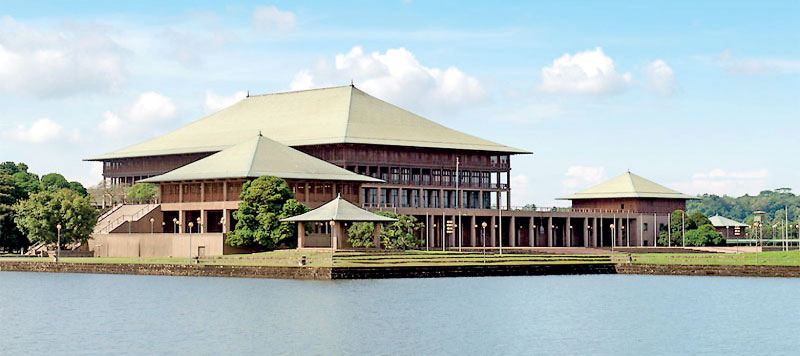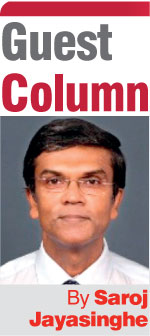Thursday Feb 19, 2026
Thursday Feb 19, 2026
Monday, 25 April 2022 00:00 - - {{hitsCtrl.values.hits}}

 Protestors around the country are demanding an urgent resolution to the crisis affecting Sri Lankan society. The proposals include removal of those in power, shuffling of posts and changes to the structure of governance. Many are studying such proposals from different angles. This paper analyses the crisis from a systems perspective and derives proposals using simple principles. They ought to be applicable to any future scenarios, irrespective of who is in power or the personalities involved.
Protestors around the country are demanding an urgent resolution to the crisis affecting Sri Lankan society. The proposals include removal of those in power, shuffling of posts and changes to the structure of governance. Many are studying such proposals from different angles. This paper analyses the crisis from a systems perspective and derives proposals using simple principles. They ought to be applicable to any future scenarios, irrespective of who is in power or the personalities involved.
What is a system?
A system is a set of things or agents working together as parts of an interconnecting network. They often act according to a set of rules to form a unified whole. A plant, breathing oxygen, using sunlight to produce energy and carbon dioxide is an example of a natural system. A school, is an example of a social system.
The politicians could be considered as members of a ‘profession’ who form networks and are in constant interactions with each other. They interact based on certain rules of engagement, and could be considered as a cohesively functioning system. Within this system are denser networks based on family ties, political parties and friendships.
What is power?
Power is defined as the capacity to make others obey and comply. Authority is the legitimate branch of power and is exercised by society through legal means. Citizens are obliged to obey authority, but empowered.
Social groups or individuals have overlapping sources of power and authority. Hierarchical administrative structures are a common source of power. Other sources include power through the political structures, economic relations, cultural factors (e.g. gender), religion, access to arms, and so on. For example, a senior male manager in a business establishment has power over a female employee through his higher income, male gender, elitist status, and administrative ability to control the destiny of the employee.
The political system in Sri Lanka
One root cause of the current crisis in Sri Lanka is because the political system has gained excess power. They have gained this historically through the constitution, using corruption to amass wealth, by a culture of subservience and by controlling the media. They also gain power through illegal means such as coercion through violence or threats of violence.
From a systems perspective, Sri Lanka needs an immediate reduction in the power of the political system. This means, some of the power of political systems ought to be transferred ‘away’ from the hands of the politicians and the political system. This is in contrast to redistribution of power. Calls to abolish the executive presidency or devolution of power to provinces are examples of ‘redistributing power within’ the political system. These will continue to allow politicians to wield undue powers, and is understandably a hot favourite among them!
Measures to reduce power of the political system
What are the measures to reduce the powers of the political system? In order to answer this, we need to analyse the structure of power in further detail. I have categorised under four headings: Power vested through the political office; Power gained through wealth; Power gained by controlling information flow (i.e. media) and; Coercive power through violence or threats of violence. For each of these categories, I have listed ‘do-able’ actions. They have been identified using a technique somewhat similar to a ‘systematic literature search’ in scientific studies. These points are proposed with the best interest of the nation, and to have maximum impact they should not be considered in isolation.
1.Reducing powers of political office
a. Repeal the 20th Amendment and transfer some powers of the presidency to parliament. This could range from complete transfer, to transfer of some of the power
b. The Constitutional Council which is empowered to appoint independent commissions should be less influenced by the political system. Operationalise this by reducing the number of members who are appointed by the president or parliament
• Establish new independent commissions in key areas (e.g. a National Health Commission, Social Welfare Commission) to give long- term policy directions. Use the National Education Commission as a model. Include citizen participation,
• Strengthen existing independent commissions, especially the Public Service Commission which is responsible for appointments to the administrative services.
c.Certain appointments are currently made by the political system (e.g. appointment of Chancellors to universities or some members of the Sri Lanka Medical Council). Transfer these powers to the relevant administrative structures, professions and citizen representatives
d. Reduce number of cabinet ministers, thus limiting the number wielding powers of a minister
e. Disallow party crossovers after election. Crossovers enable politicians to be bought over and lead to a concentration of power
f. Human resources in state sector institutions should be decided only by the administrative services. Abolish the chit system: the requirement to have recommendations by politicians to obtain government jobs
g. Disallow those holding office in NGOs, Sports bodies, and businesses to contest elections or hold political office and vice versa. This is to minimise infiltration of civilian organisations by power from political system.
h. Disallow appointing immediate family members of politicians to paid positions in their respective ministries or MPs offices. This is to reduce power concentrations around politicians.
2.Reducing power over the media
a. Politicians once elected should not hold office in media institutions of the state (e.g. Rupavahini) or private sector.
b. The media units of the respective ministries should be removed from the control of the respective minister.
3.Reduce power that could be obtained through unethical accumulation of wealth
a. Donations to political parties and politicians should be restricted, taxable and made public. Receipts should be issued. Anonymous donations should not be allowed
b. All overseas donations should be reviewed by a special committee to prevent foreign influence
c. Political parties should release statements of all accounts and audit reports of local and overseas branches.
d. All contestants in elections should publicly declare assets and do so annually
e. Foundations and NGOs established by politicians should be listed, regularly audited, and presented to Parliament
f. Those indicted for corruption in the courts, either local or overseas, should not be allowed to contest or hold any political office
g. Politicians should declare assets, any potential conflicts of interest, and their tax files should be public documents
h. Subsidies and pensions for politicians should be the same as those received by government servants
4.Reduction in coercive power
a. Prevent those with criminal records contesting or holding any political office
b. Political parties having convicted criminals as office bearers should automatically lose their recognition as a legal political party
c. Reduce the security for politicians to a minimum. Armed security should wear official uniforms
d. Discontinue motorcades other than during official ceremonies
e. Limit inviting politicians to public functions
f. In future, no roads should be named after any politician and statues of politicians should not be erected in public places. They can do so in their own gardens using private funds.
Once a consensus is reached on the required actions, the next step is to describe the legal, administrative and constitutional steps required to implement them. A few need constitutional amendments (long drawn out). Others need amendments to Acts of Parliament or new Regulations. A few will be dealt by administrative circulars. These actions and the responsible institutions have to be listed. It is best that the process of reforms is monitored by an independent structure (e.g. a Citizens Working Committee on Reforms). If not, these will soon be buried and forgotten.
Over to you, the next generation of activists… Best wishes.
(The writer is an Emeritus Professor of Medicine and a Consultant Physician. The views expressed do not reflect the views of any organisation he is affiliated to.)